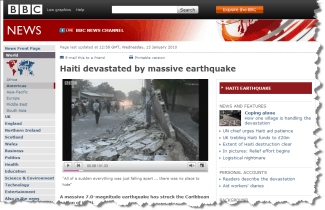At long last the poor people of Haiti are receiving international aid. It’s taken almost a week for a significant response. Indeed, the UK Government initially promised aid which was about half the salary they agreed to pay the boss of the Royal Bank of Scotland. Millions of disadvantaged people were expected to share £6m, whereas Mr Hester got £10m to himself. But that’s not the real issue. The real problem is that governments the world over were completely unaware of the true nature of this disaster – even though the rest of us knew.

When the news broke in the UK, the 24-hour news channels broadcast it around 45 minutes after the first quake hit Port-au-prince. In that first hour the seismologists who monitor earthquakes 24/7 had analysed the information they received and said, with one voice, that this was a “big one” with potential for a huge impact, simply because of where it was. An hour later the first pictures of the damage were shown. Where had this pictures come from? The country was without communication systems and without electricity.
Those pictures, broadcast to the world, had arrived via Twitter. People using laptops and satellite phone technology had started to let the world know the reality of the situation. Just half an hour or so later the first videos were arriving on YouTube and broadcasters such as CNN and Sky News were showing them. Anyone watching these channels would have known the seriousness of the situation. The Twitter stream for haiti also revealed the extent of the damage and the enormity of what was going on.
Yet the British Government slept safely in their beds, not surfacing for comment for many hours. Similarly, all around the world, our so-called “leaders” failed to respond rapidly. This is in spite of the knowledge about the situation that was widely available on Twitter, YouTube, Facebook and a plethora of forums. The people of Haiti were telling us exactly what had happened – yet for a couple of days the “international community” (whatever that is) twiddled its thumbs, it seems.
In reality, of course, they didn’t do this. They were working in the background. In truth the governments of the world have been caught “behind the times”. Nowadays news is spread within moments, right across the world, thanks to the likes of Twitter. In the past, we might not have known about this kind of disaster for several days anyway. By that time, the world’s governments would have been able to get organised; their plans would have been in place and to the rest of us it would look like an “instant” response. We would have been proud of them. Even in the world of 24 hour news, much information was “old”. After all, it was almost 24 hours before any TV crews arrived. As a result, without the presence of Twitter and YouTube we would have been none-the-wiser.
With Twitter, Facebook and YouTube we can now find out instantly the extent of any particular situation; the wool is no longer over our eyes. And that’s the gap that Twitter has exposed. The world’s governments were still working in the rules of the “old world”, where diplomatic offices could report back before TV crews had arrived and then the leaders could have prepared their responses. In Haiti, that seems to be what has happened. The Government was apparently blissfully unaware of the information flowing around the world on Twitter and YouTube.
Clearly, for any future disaster they need to monitor such social networks constantly so they can respond appropriately and much more quickly. This time their slow response is largely borne out of the fact they relied on old-fashioned techniques. The world has moved on – governments clearly haven’t.
But it also begs the question – have you moved on? Do you know what is going on in your industry or sector? Because you can bet your last farthing that it’s being discussed right now on Twitter and Facebook. The situation being Tweeted right now about your business sector could have a direct impact on the future of your business or the potential you have for greater success. If you are not monitoring Twitter or Facebook, for instance, you are going to be in the same situation as the Government has been on Haiti – caught napping. That means there is a growing gap between businesses who monitor Twitter or Facebook or other social networks and those who do not.
The businesses that use social network information to monitor the news in their sector are the ones that can respond. The rest are using old-fashioned communications methods and may well be too late to take advantage of the news and information spread via the likes of Twitter. The horrors of Haiti have shown the chasm that exists in the communications departments of the world’s Governments. There may come a time where your lack of use of Twitter or Facebook could expose a similar gap between you and your business sector.

